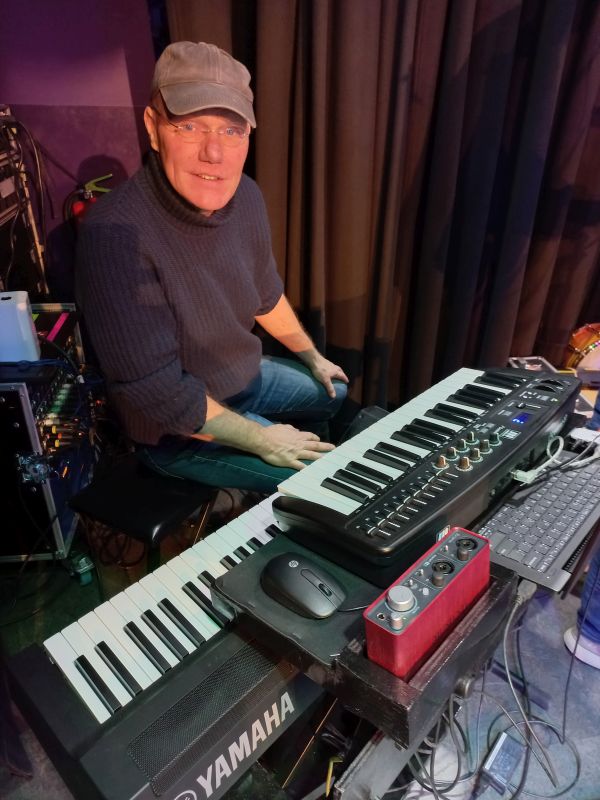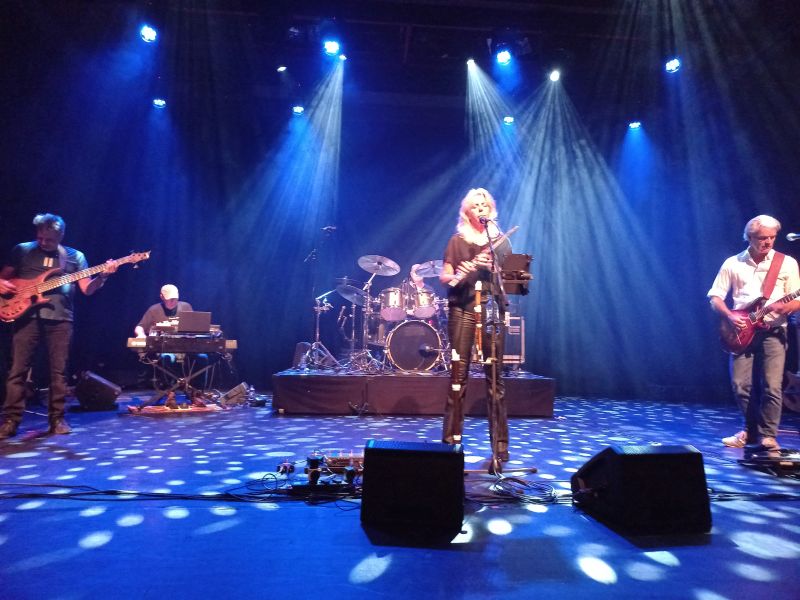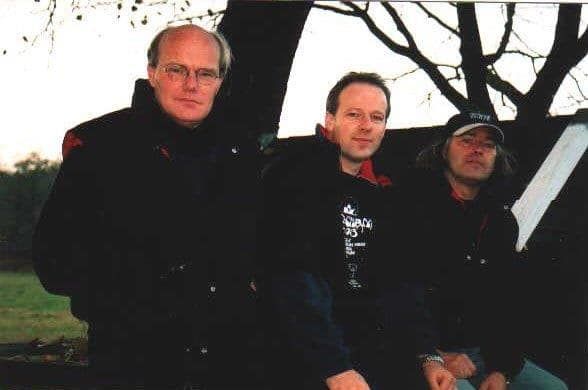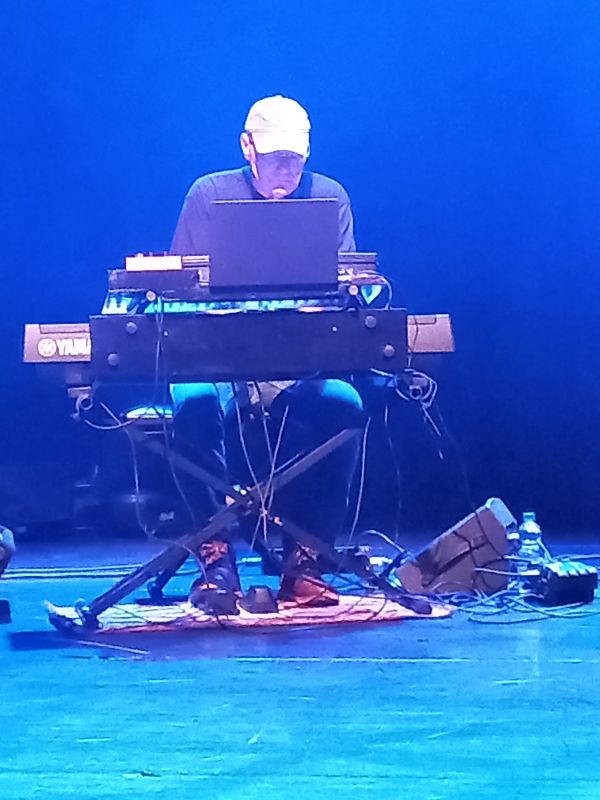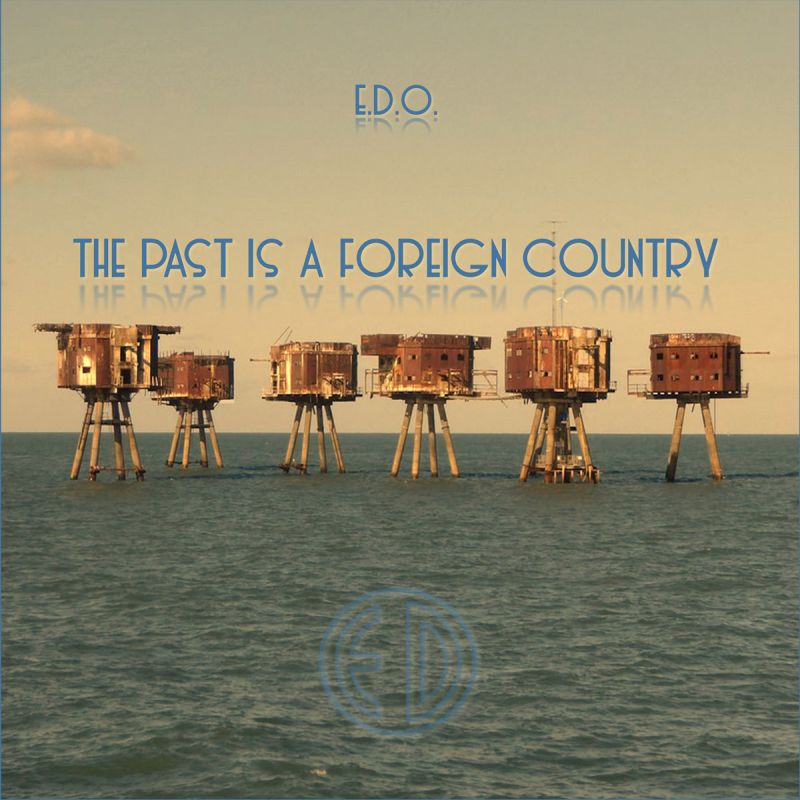|
Interview Edo Spanninga (Flamborough Head, Trion) "I think this album is for enthusiasts who are historically interested and love prog" (September 2025, text Henri Strik, edited by Peter Willemsen) Edo Spanninga is a keyboard player from the Netherlands. Most people who love progressive rock know him as a member of Dutch bands Flamborough Head and Trion. Like many other musicians playing in a band, he felt the need to record a solo album. This year he was able to satisfy that need. Under the moniker of E.D.O. he released the album The Past Is A Foreign Country (see review). It is an excellent instrumental album that most lovers of retro prog will enjoy. Of course, the editorial staff of Background Magazine was very curious to find out how this album came about. Would you please introduce yourself to the people who might not know you, and tell our readers which bands have influenced you in the past and nowadays?
What was the reason to record a solo album and why did you use the name E.D.O.? "So far, all the records I participated in were a collective achievement. I thought it would be fun to make an album on my own just to see if I am capable to do so. Of course, nowadays it is technically easier to publish your own production. I didn't have a good explanation as far as the name is concerned, but in 2009 I participated under that name in the project Röksteen, A Tribute To Swedish Progressive Rock Of The 70's and I sticked to that name." I heard drums, guitar and flute parts on the album. Did you play everything yourself and if so what instruments did you use? I heard a Mellotron as well. Did you ever play on a real Mellotron? "Well, I played all instruments myself except for the drums. On the internet there are all kinds of drum libraries for sale. You can edit, arrange, and place it in such a way that it becomes your 'own' drum track that matches your music. I played all the other instruments on my keyboards. The Rickenbacker bass sound is a VST from Scarbee/Native Instruments. For many vintage synth sounds, I used Retro Machines MK2 (Native Instruments). The Hammond organ and the Mellotron samples come from IK Multimedia. Unfortunately, I never played on a real Mellotron. Therefore, I use samples. For the 'Mellotron Police' on the internet this is a mortal sin, but I have no problem whatsoever with it. Everything is sampled these days. It has been accepted for a piano and why not for some other instruments? Anyway, the Mellotron is a sampler, so why bother?"
"The Past Is A Foreign Country is a quote and not my find. I think it is a beautiful sentence that clearly reflects the feelings you can have about all the changes in the world these days. Even our own past is gradually becoming a closed period, after which you can look at it as an outsider. I once studied history, and I have been socially interested and involved ever since. So much has changed in recent years, and not all for the better. Achievements such as parliamentary democracy, the Trias Politica, respect for human rights, international cooperation - it is all at stake. I thought it would be interesting to make something about this. Of course, normally progressive rock should be about jesters, trolls, elves, and other gnomes, but for once this subject seemed urgent to me." The album contains two bonus tracks: Cathedral Green and Pa Gata. Why are they not part of the concept and what are these songs about?
How did you manage to give all the songs a different mood? Do they match the subject of the composition? What do you mean by 'a historical spoken word progumentary for boomers? "When creating the CD, I tried to compose in such a way that it fits the themes and periods. Wannsee about the Second World War naturally needs a different vibe than Houston, which is about the sixties. The album is documentary-historical in design and is about the post-war history that the prog rock generation has almost completely experienced. Due to the genre and the themes, 'boomers' in particular will listen to this album." Why did you decide to record an instrumental album and not using any vocalists? "From the beginning my intention was to make an instrumental solo album. I wanted to do everything myself, but unfortunately I can't sing. To use the human voice anyway, I thought it would be a nice alternative to do this with historical 'spoken word' fragments. I was surprised how some speakers deliver their speech in such a way that it is almost like singing. Just listen to 'I Have A Dream' by Martin Luther King."
I heard many historical audio recordings. Was it difficult to get them? "Not at all since all fragments can be found on YouTube. It is more difficult to find out the copyright's holder for each fragment. Many recordings are in the 'public domain', but for some you have to ask permission and pay a fee. Sometimes it was not possible to find the rights holder and in a few cases we didn't receive any response after asking permission." How long did it take to record the album and what would you say was the most difficult part of the album to record? "I spent about a year working on this album. I found the most difficult part the lack of criticism while working on this CD. In a band I'm used to be corrected by the other band members and that makes a final product better. Now I walked a little lonely through this labyrinth." Any profits of this album will be donated to the UN Refugee Agency UNHCR. Why did you choose this organization? "Yes, that is correct but only after all costs have been recovered, I will donate any profits from this album to this charity. For me, music is a hobby, and I am already very prosperous and privileged, so I don't have to earn anything from this project myself. In this time of geopolitical tension - in a way the topic of my album - refugees are more vulnerable. You see hostility towards refugees increasing everywhere. Not only in America, but also in Europe and in the Netherlands. At the same time, you see the influence of the UN diminish, and with it the effectiveness of the UNHCR. In my opinion these are all bad developments, so I thought it would be a nice gesture to draw attention to this."
"I designed the cover myself. I wanted an old-fashioned, discoloured Polaroid-like cover to emphasize the historical theme of the album. The Maunsell Sea Forts at Red Sands were built by the British army off the English east coast in the Thames Estuary during the Second World War as coastal defences. After the war, the sea forts were no longer used. Now it is the only remains from the past, like alien machines, which ran away from the science fiction novel The War Of The Worlds by H.G. Wells." You have your own recording studio named Studio Aurelia. When did you start it and which people have already recorded there? "Nowadays you already have a studio if you own a laptop. I have been recording myself for more than thirty years, mainly my own bands and projects related to it. It is not a commercial studio that can be booked." The album was released on your own label Aurelia-Records. Why didn't the Polish OSKAR Records release the album since they released all the Flamborough Head albums? "I offered OSKAR Records the CD, but they doubted whether an instrumental album with historical fragments would yield any profit for them. I can understand that. Prog is already difficult to sell, so I think this album is for enthusiasts who are historically interested and love prog." Are you going to release more albums from other acts on this label? "I don't mean to grow Aurelia Records into a real label." What are your future plans? Are you going to play some of the music of the album live on stage? "Well, the future is a foreign country... we've never been there before, have we? Bringing my solo album live is of course an attractive thought. I know plenty of musicians with whom it could be done, but reality also wants it to be a financial suicide." Thanks for answering my questions Edo, and success with your new project and the album! "You're welcome and thank you for paying attention to my album!" bandcamp review album 'The Past Is A Foreign Country' |
